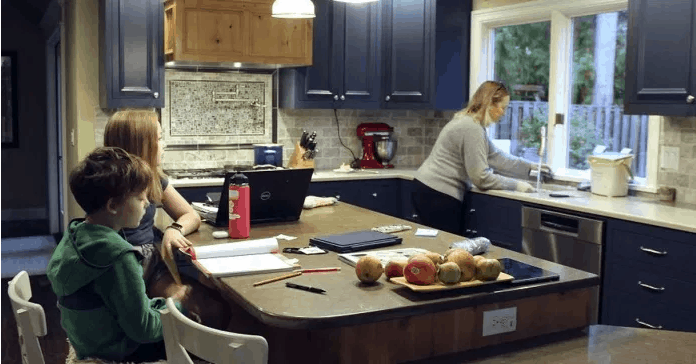
In the age of the pandemic, working from home solves, but also causes many problems. According to experts, what is mainly needed is to have and follow consistent rules.
We get out of bed, make a short stop in the bathroom and suddenly, in zero time, we are in … our office. For many Germans this is the new routine in the coronavirus era. According to a recent survey by the Bitkom Digital Entrepreneurship Association, more than ten million people, or one in four of the economically active population, now work from home. Most people appreciate the benefits of this opportunity and say that they want to maintain a flexible workplace after the pandemic. However, there are also disadvantages, which become more and more visible over time.
Klaus Dore, a professor of sociology at the University of Jena, believes that working from home has a long-term negative effect. He identifies three negative factors: increased insecurity in the employee, lack of any social relationships that can develop in the work environment and intensified work stress. An example: Unlike a physical conference, teleconferencing does not offer the possibility for direct feedback, which is usually done with small gestures and short comments, but which are very important. There is a lack of confirmation needed to evaluate one’s own presence, resulting in insecurities or even aggressive behaviors. “What has completely disappeared is the gossip in the kitchen, where you go to make coffee and change two conversations,” says Klaus Dore. “That’s where the best ideas come in, because creativity is a team affair.” The chance encounter in the corridor belongs to the past. In the digital space, each meeting is limited in time and serves a specific purpose.
New control mechanisms
The term “work from home” implies a discharge, a greater relaxation in relation to attendance and physical presence in the office. However, the phenomena are deceiving, warns Professor Klaus Dore. This is because, as he points out, the degree of our personal autonomy is limited, as new control mechanisms appear. Responding to a questionnaire, 48% of respondents believe that working from home does not facilitate or “rather does not facilitate” the reconciliation of personal and professional life, while 60% see the boundaries between the two as dangerously confused.
More difficulties for women
A greater burden falls on women, who are still responsible, to a greater extent than men, for the so-called care work, ie household and child care in parallel with any professional activity. Return to traditional roles? “There is no going back to traditional standards, because the truth is that traditional standards have never changed …” says Ania Gerlmeier, a psychologist and research fellow at the University of Duisburg-Essen. In a recent Bertelsmann Foundation study, 69% of women surveyed said they still had the “primary responsibility” for household chores.
Working from home causes additional difficulties. Trying to catch them all, women usually choose a workplace in the kitchen or other easily accessible space rather than in a secluded room, resulting in occasional annoyance or distraction. The degree of difficulty intensifies when there are children. As Ania Gerlmeier characteristically says “it is doomed in advance to try to meet the rhythms of work from home and at the same time to teach children the laws of Mendel …” The result is that male colleagues take advantage of any opportunities for professional development . Especially after the closing of the schools in the first lockdown in March, the psychologist emphasizes, “many women exceeded the limits of their mental endurance, as a result of which they face not only professional difficulties, but also health problems”.
The right balance is sought
However, everyone agrees that returning to full-time office work, as we knew it before the crisis, is unlikely. After all, notes Ania Gerlmeier, working from home also has advantages. Sociologist Klaus Dore sees a positive sign, saying that “now what matters is to establish rules for the new reality, for example mixed forms of office and home work.” This is the conclusion reached by Bitkom’s research, calling on politicians to form the appropriate legal framework, with a strict separation between the professional and personal lives of employees.
Source: en24news.com




